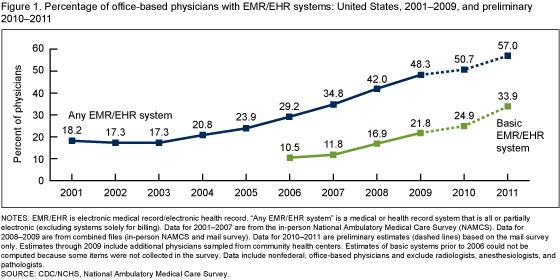The Role Tablets Play in the Digitizing of Medical Records
- Apr 18, 2012
Have you noticed a reduction of paper used in your own doctor's office? According to the CDC, 57 percent of office-based physicians have been using electronic medical record / electronic health record (EMR/EHR) systems as of 2011, up from just 18 percent in 2001. To this trend, research firm, MarketsandMarkets forecasts that Electronic Medical Record and Electronic Health Record industries are expected to reach $6 billion by 2012 in the US alone.
There is no denying that digitizing medical records has the potential to keep patient documents safer and improve overall quality of patient coordination and care. However, this is only true if healthcare professionals have the right tools to help them effectively access these records. For the health industry, the implementation of tablet devices can offer the benefit of true mobility when it comes to showing patient information and making changes in real-time, while cutting costs for paper and the associated hassles of hard-copy records.
When determining the right tablet solution for medical industry professionals, it is crucial that resellers consider the following points:
Security: Clearly, security is a huge concern for professionals and patients alike. Windows-based tablets are an answer, as they include features such as built-in firewalls and data recovery settings. Third-party software and services can also further enhance device security and it is important to note that the Windows platform supports more of these features than the typical mobile operating system.
Image quality: Ultrasound imaging solutions manufacturer Interson Corporation is using our ViewPad 10 as part of its latest ultrasound solution to display images and data from its propriety ultrasound probe. As your customer will also likely be using the tablet for the review of critical client X-rays and other medical scans, excellent display quality is critical for an accurate diagnosis.
Processing power: For medical imaging needs, a higher quality processor may be required to handle a hospital's various software programs. Also consider that since FDA approval of the first mobile medical app in 2009, the use of medical apps will continue to grow and become more widely accepted, meaning tablets will need not only a great processor but also extensive storage options to support these applications.
What trends are you seeing in the medical field when it comes to the digitalization of client records? How do you feel the introduction of tablets into the medical profession will change the way patients receive treatments? Share your thoughts with us here on the blog.
Adoption of EMR/EHR systems by office-based physicians has increased.





Login and Registration Form